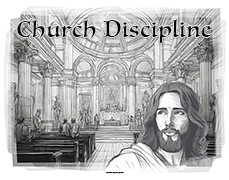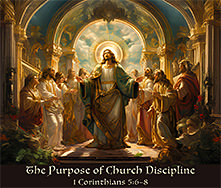First Corinthians 5:1–13 . . .
Church Discipline
In the first four chapters of First Corinthians, Paul introduces a shameful problem in the church that was furthered by a lack of discipline. The Corinthians proudly attach themselves to certain leaders whose teaching seems to disclose a “wisdom” not known or taught by other teachers, and certainly not by Paul or his fellow-apostles. Cliques and factions are undermining the unity of the church by denying the gospel of Jesus Christ. In chapter 5 (as well as 6), Paul calls attention to two other problems plaguing the church: immorality and lawsuits.
It’s bad enough that Apostle Paul learns of the immorality in the Corinthian church; but what Paul has yet to say is even more disturbing. While it’s possible, even likely, that immorality is commonplace in this church, Paul turns to a specific instance (see v. 1 shown at the bottom of this page) in which a son has taken and continues to live immorally with his father’s wife. But while Paul is distressed by the sin of this man, he’s even more disturbed by the sinful response of the church body: being proud while at the same time, the church did virtually nothing to correct this immoral matter.
Although Paul is physically far removed from Corinth and its immoral ways facilitated by little or no discipline, he’s never spiritually absent. Many of the Corinthians are Paul’s spiritual children (4:14–16). He not only writes to them but makes every effort to obtain reports of how they’re coming along, while iterating the following seven essentials of discipline.
1) Church discipline is a process. In this short chapter, Paul speaks of the final step of discipline. Matthew 18 spells out the full process of church discipline. Paul deals only with the last step of this process here because the willful rebellion of the sinner is evident; his sin has already become public knowledge. Discipline must be as public as the sin.
2) Church discipline is the obligation of the whole church. Paul speaks of the discipline process taking place “when you are assembled.” Our Lord instructed that the matter be told “to the church” (Matt. 18:17). In the case of the immoral man in the Corinthian church, the matter has already become public knowledge. Consequently, the correction must be as public as the sin. We see in Matt. 18:19–20 that the final step of discipline is taken by the entire church, when they’ve assembled. The Lord promises his special presence when such a gathering is assembled for discipline.
3) Church discipline involves all of the local church, having implications for the church at large. Paul calls for the whole Corinthian church to become involved. This is a most difficult assignment, for the Corinthian church is divided into various factions that seem unable to work together on anything. Because church discipline should be exercised in unity, Paul not only requires the whole church to participate in this act of discipline, he strongly implies that church discipline should be exercised more generally, by all the churches.
4) Church discipline is to be done in the name and power of our Lord. The church acts on behalf of the Lord in carrying out discipline. This is why the Lord’s presence is promised in discipline, and why Paul speaks of acting “in the name of the Lord Jesus” and in “the power of the Lord Jesus” (v. 4). We act on God’s behalf; when we act, God acts as well (Matthew 18:18–19).
5) Church discipline delivers the sinner into the power of Satan the destroyer. The church expels the wayward and unrepentant saint, preventing him (and her) from participating in its worship (e.g., taking Holy Communion) and separating the saint from fellowship with believers as individuals or small groups. As a result, the sinning saint not only loses the positive benefits of being a church body member, but is placed in the very dangerous position of being vulnerable to Satan’s attacks.
6) Church discipline is only for those who are saints or for those who profess to be saints. Paul makes it very clear (vv. 12, 13) that church discipline is for only those who are members of the church.
7) Church discipline isn’t a final judgment that condemns one to eternal hell, but one that has the goal of providing the sinner’s repentance and final salvation. Church discipline is to be exercised for the highest good of the sinning saint. Consequently, Paul makes it very clear that “hand this man over to Satan” in church discipline isn’t a final act of condemnation but an action taken with a view to the wayward saint’s repentance from sin in this life, or at least his spiritual salvation in the next.
Paul’s understanding of the church’s next steps regarding becoming disciplined can be summarized with two titles:
(1) a Biblical Mandate for Church Discipline (vv. 6–8) and (2) a Clarification on Separation (vv. 9–13). His words in chapter 5 are sobering, yet they’re meant to be. He’s already written, “If any man destroys the temple of God, God will destroy him, for the temple of God is holy, and that is what you are” (4:17). Now, the Corinthians are reminded of their duty to become disciplined by removing the wayward, willful sinner from their midst.
Note: 1st Corinthians challenges believers to examine every aspect of their lives through the lens of the Gospel. In chapters 5–7, Paul presents these three challenges:
Dealing with a case of incest (ch. 5) | Lawsuits among believers (ch. 6) | Concerning married life (ch. 7)
› Watch BibleProject’s superb animated video (1 min.) that highlights Paul’s messages in these three chapters.
† Summary of 1 Corinthians 5:1–13
The text of this passage addresses a serious case of sexual immorality within the Corinthian church coupled with Paul’s instructions on how to handle it. Here’s my summary of its key points:
• The Issue of Sexual Immorality (v.1)
Paul confronts the Corinthian church about a case of sexual immorality so egregious that even pagans would find it unacceptable. A man in the church was having a sexual relationship with his father’s wife (likely his stepmother).
• The Church’s Response and Paul’s Rebuke (vv. 2–3)
Paul expresses shock that the church hasn’t taken action against this sin. He rebukes them for their pride and lack of grief over the situation.
• Paul’s Judgment and Instructions (vv. 4–5)
Despite being physically absent, Paul pronounces judgment on the offender. He instructs the church to do three things:
1) Expel the sinful man from the congregation
2) “Hand this man over to Satan,” which likely means excluding him from the church community
3) Do this for the purpose of potentially saving the man’s spirit on the day of the Lord
• The Purpose of Church Discipline (vv. 6–8)
The purpose of church discipline in vv. 6–8 is multifaceted. Paul explains that this action serves multiple purposes:
1) To maintain the purity and holiness of the church… Paul uses the metaphor of yeast spreading through dough to illustrate how unchecked sin can contaminate the entire church community. The purpose of church discipline is to maintain the purity and holiness of the church
2) To prevent the “yeast” of sin from spreading through the whole community&8230; By addressing and removing the "yeast" of sin, the church aims to prevent its spread throughout the congregation. This action serves to protect the spiritual health of the community as a whole.
3) To potentially lead the sinner to repentance and salvation… While the disciplinary action may seem severe, its ultimate goal is redemptive. By excluding the unrepentant sinner from the community, the church hopes to lead him or her to recognize the gravity of their actions and potentially bring about repentance and salvation.
• Paul’s Broader Application (vv. 9–12)
Paul extends this principle of church discipline to other serious sins, instructing the Corinthians not to associate with anyone who claims to be a believer but persists in sexual immorality, greed, idolatry, slander, drunkenness, or swindling
• Conclusion (v. 13)
The passage concludes with Paul quoting Deuteronomy 17:7, emphasizing the church’s responsibility to judge those inside the church and remove the wicked person(s) from among them.
This chapter underscores three essentials: (1) the importance of maintaining moral standards within the Christian community, (2) the role of church discipline in addressing serious sin, and (3) the balance between grace and holiness in the life of the church.
- Q. 1 Why does Paul react so strongly about the immoral brother in the Corinthian church? What does Paul tell them to do?
- Q. 2 What wrong attitude toward the problem in their church did the Corinthians have?
- Q. 3 How could handing “this man over to Satan” (v. 5) be good for that man?
1 Corinthians 5:1–13
New International Version (NIV)
[You can view it in a different version by clicking here; you can also listen to this chapter.]
Dealing With a Case of Incest
1It is actually reported that there is sexual immorality among you, and of a kind that even pagans do not tolerate: A man is sleeping with his father's wife. 2And you are proud! Shouldn’t you rather have gone into mourning and have put out of your fellowship the man who has been doing this? 3For my part, even though I am not physically present, I am with you in spirit. As one who is present with you in this way, I have already passed judgment in the name of our Lord Jesus on the one who has been doing this. 4So when you are assembled and I am with you in spirit, and the power of our Lord Jesus is present, 5 hand this man over to Satan for the destruction of the flesh, so that his spirit may be saved on the day of the Lord.
6Your boasting is not good. Don’t you know that a little yeast leavens the whole batch of dough? 7Get rid of the old yeast, so that you may be a new unleavened batch — as you really are. For Christ, our Passover lamb, has been sacrificed. 8Therefore let us keep the Festival, not with the old bread leavened with malice and wickedness, but with the unleavened bread of sincerity and truth.
9I wrote to you in my letter not to associate with sexually immoral people — 10not at all meaning the people of this world who are immoral, or the greedy and swindlers, or idolaters. In that case you would have to leave this world. 11But now I am writing to you that you must not associate with anyone who claims to be a brother or sister but is sexually immoral or greedy, an idolater or slanderer, a drunkard or swindler. Do not even eat with such people.
12What business is it of mine to judge those outside the church? Are you not to judge those inside? 13God will judge those outside. "Expel the wicked person from among you."


